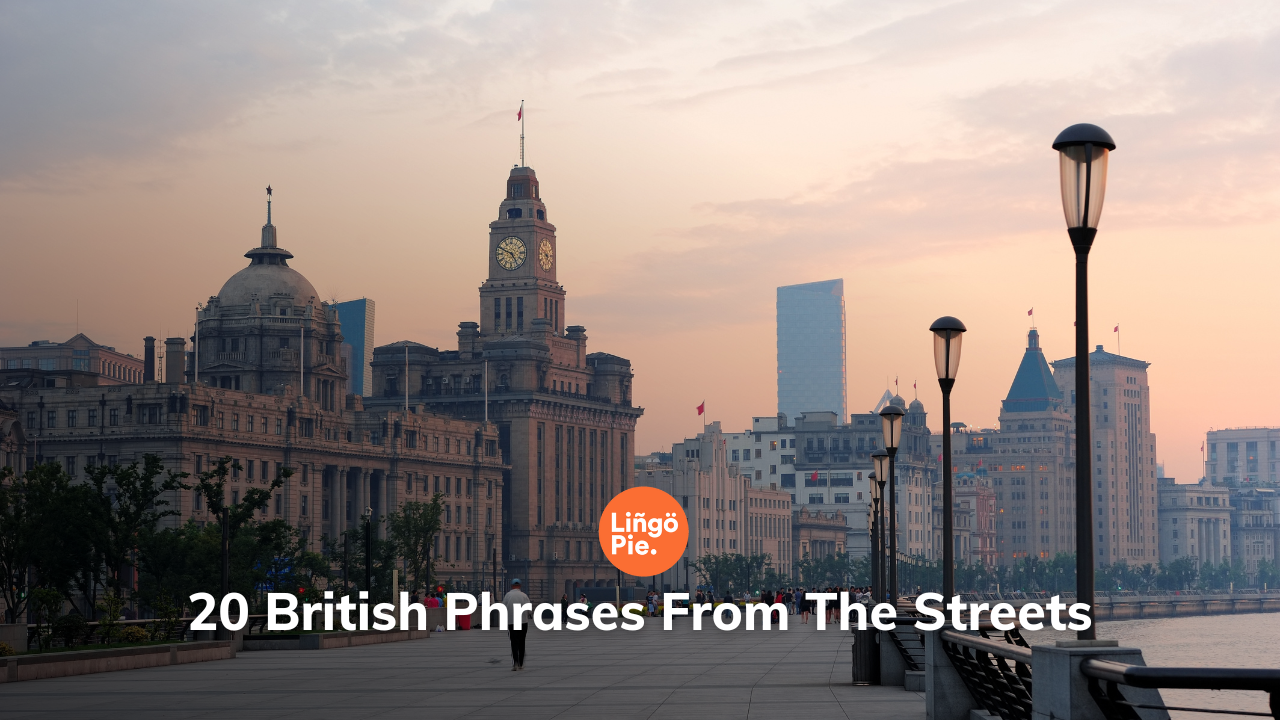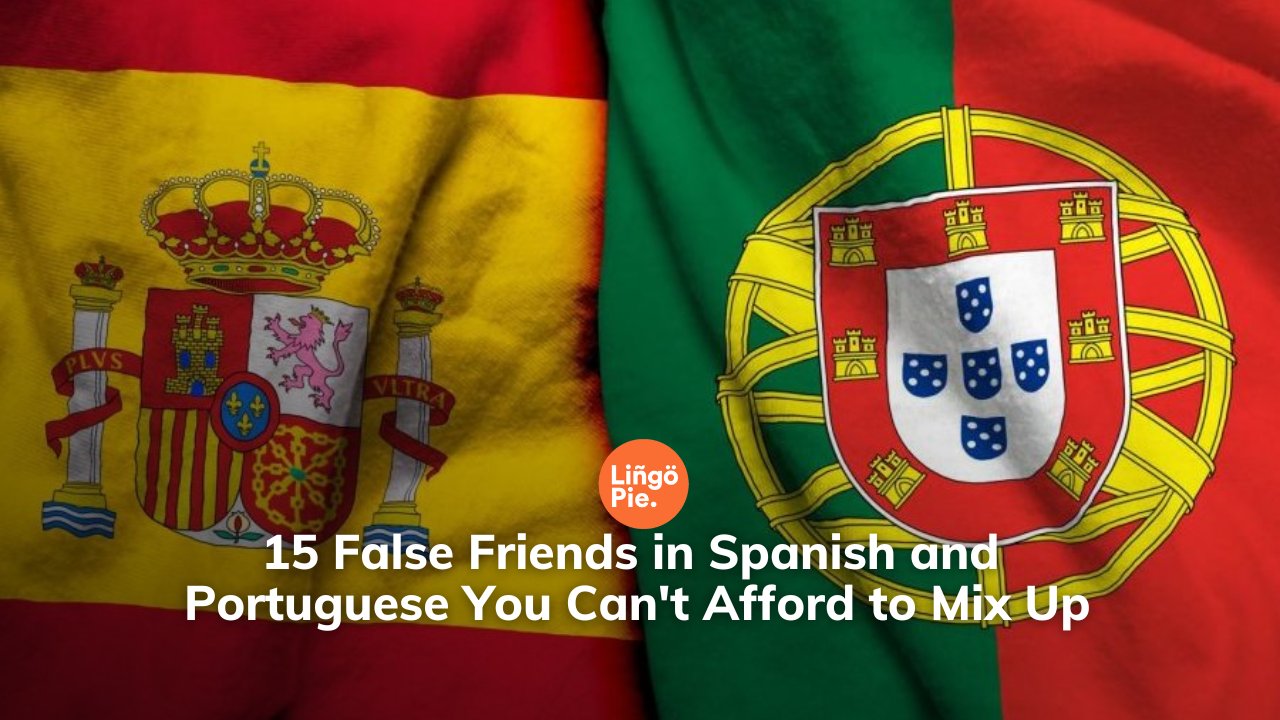Despite the ‘American accent’ being the easiest for most ESL speakers to copy, English began in England, in the heart of Great Britain, 1600 years before the language reached America or anywhere else in the world. British youths of today still edit, change and adapt the language in hundreds of new ways every year, as our unique and absurd culture, personalities and informalities continue to create our unique society and therefore the evolution of the English language.
Perhaps academically, you’ve been taught useful vocabulary, phrasal verbs and standardised collocations that you can use worldwide, and perhaps on your own through watching TV or movies you’ve learnt slang terms and informal grammar usage from the US or other native-speaking countries. But there’s nothing quite like raw, grungy lingo from the pits of British streets - because real life in England, Scotland and Wales is far from “tally-ho” and tea parties like you see in the popular period dramas.

So here’s a list of 20 of the best British terms and phrases that I can guarantee you didn’t learn in school, and you can see how we put the ‘great’ in Great Britain:
1. Init (phrase)
This was originally a colloquial way of using the tag question, ‘isn’t it?’ at the end of a sentence, for example, “It’s cold today, isn’t it?” But as we became less polite and more assertive in informal contexts, we began to instead say, “Cold today init.”
Nowadays, ‘init’ or ‘innit’ is no longer used as a question and is much more often used as a statement of agreement.
Example:
Friend 1: It’s raining so much today.
Friend 2: Init.
Friend 1: Let’s stay in and watch The Great British Bake Off, it’s so good.
Friend 2: Init!
2. Peng (adjective)
Meaning delicious or tasty, ‘peng’ can be used to describe a meal or a person.
Example: “Damn, this tastes peng.” or “Yo, you look peng ya kno.”
3. Piff (adjective)
With a similar definition to ‘peng’, ‘piff’ means tasty or nice, but is more widely used to describe how attractive someone looks. And when used as a noun, ‘piff’ is a type of purple cannabis.
Example: “Yo, check out that gyal [alternative spelling of ‘girl’ or ‘gal’] she is piff ting!”
4. Sick (adjective)
From the verb ‘to be sick’ meaning ‘unwell’, (“I feel sick”) to the noun ‘sick’ which is a synonym of ‘vomit’ (“I’ve just been sick. I’ve got sick on my shoe”), somewhere along the line, the word ‘sick’ has been ameliorated to mean ‘good’, ‘cool’, or ‘awesome’.
Example:
Friend 1: I’m going on holiday next week.
Friend 2: That’s so sick, where to?
Friend 1: Italy, bro. The food there is peng.
Read Also: 10 Popular English Gen Z Slang Words and Where They Came From
5. Whack (adjective)
When we describe things as ‘whack’ it means it’s very bad or unbelievable. We also use the verb ‘to whack’ meaning ‘hit’, for example, “She whacked him really hard” but its most common usage is as a negative descriptive.
Example:
Sister 1: Turn your music down, it’s so whack!
Sister 2: Swifty ain’t whack, she’s sick!
6. Bare (adverb)
Now, new nouns and adjectives are easy to add to a language, but new adverbs? This is what I love about the English language and British culture especially! ‘Bare’ is originally an adjective meaning ‘without clothes’, for example, the collocation ‘bare feet’. But in the streets, ‘bare’ means ‘very’, ‘really’ or ‘a lot of’.
Example: “I wanted to crash [stay over] at her house, but she had bare cats and they were bare noisy and I was bare tired, so I just went home.”
7. Peak (adjective)
Originally a noun for the top of a mountain or cliff edge, ‘peak’ in the streets is used as an adjective to describe something as absolutely terrible. The worst of the worst.
Example:
Friend 1: My grandad died.
Friend 2: That’s bare peak, sorry man.
8. Long (adjective)
To describe something as ‘long’ in a traditional sense describes it as being lengthy or taking a lot of time, such as “How long is a piece of string?” or “It’s a long way to my house.” But in the streets, ‘long’ is used in a more emotional way to express something as being a great deal of effort or something that someone doesn’t want to do.
Example: “I can’t be arsed [can’t be bothered] to sit the exam tomorrow, it’s so long fam.”
9. West (adjective)
Typically used ‘up north’ (in Northern England), ‘west’ is used as an alternative way of saying ‘crazy’, ‘weird’ or ‘ridiculous’ and can be both positive or negative.
Example:
Friend 1: That film was so west.
Friend 2: Yeah, it was crazy. Leonardi Dicaprio’s acting was also pretty west.
Friend 1: Yeah, such a weird character.
10. Mega (adjective)
Originally meaning ‘large’, ‘mega’ spoken by the youths of today is just another way of saying “That’s really good.”
Example:
Friend 1: Yo, I just found out my song will be played on BBC Radio 1! Braap, braap!
Friend 2: Mega! Congrats, mate.
Read also : 10 Popular Words and Phrases That Nobody Knew 20 Years Ago
11. Mate (noun)
An alternative to ‘bro’, ‘bruv’, ‘brother’, ‘pal’, ‘dude’, ‘man’ or ‘fam’, ‘mate’ is a synonym of ‘friend’ used informally and often to replace the name of any person that you’re talking to; could be used with a friend or a stranger.
Example: “Have a good one, mate.” [Have a good day, sir.]
12. Minging (adjective)
Meaning, ‘foul’, ‘gross’, ‘disgusting’ or ‘smelly’. This is a very modern and overdramatic way of expressing dislike towards something. This word is a favourite for English people who know it but don’t use it often, especially when it’s heard in a Northern accent.
Example: “You need to wash your socks, mate, they’re minging.”
13. Mint (adjective)
Originally a noun for tea leaves and essential oil, ‘mint’ is often used as another term for ‘sick’, ‘cool’, ‘awesome’ or ‘really nice.’
Example: “Thanks for taking me out last night, it was mint.”
14. Minted (adjective)
Similar word, but totally different meaning. ‘Minted’ is used to describe someone who is extremely rich or has a lot of money.
Example: “That Jeff Bezoz guy is properly minted init.”
15. Skint (adjective)
‘Skint’ is the opposite of ‘minted’! A synonym of ‘broke’. When you’re scraping by or have holes in your pockets (when you’re without money or living off the bare minimum) people often say they’re ‘skint’.
Example: “I wanna go to that gig on Friday, but I’m absolutely skint.”
16. Mug (noun)
A soft but powerful insult that we love to use in Great Britain, a ‘mug’ is another word for ‘idiot’ or ‘silly person’. ‘Mug’ can also be a noun meaning ‘face’ (“He’s got an ugly mug”) and also the name for a ceramic cup that we drink tea and coffee out of. But most commonly these days, ‘mug’ is used as an insult.
Example: “I can’t believe you did that, you’re a right mug.” Or “Such a mug.”
17. Quid (noun)
An informal name for the British Pound, a synonym for money.
Example:
Daughter: Can you lend us a few quid? [Please can I borrow some money from you?]
Mum: I’ve only got a tenner in my purse. [I only have ten pounds.]
Daughter: Ok so gimme a fiver then. [Give me five pounds.]
Mum: Here, there’s four quid, you can take that.
Daughter: Four quid? That’s whack.
18. Bollocks (phrase)
One of our ruder terms, ‘bollocks’ is used as a plural noun to refer to ‘testicles’ but is rarely used in a context where we actually refer to this body part. More commonly, ‘bollocks’ is used as an exclamative sentence in its own right to express “Oh no” or “That’s not true.”
Example:
Friend 1: She told me she didn’t know her?
Friend 2: That’s bollocks. I’ve seen them together.
Friend 1: Hmm, that’s strange -
Friend 2: Bollocks!
Friend 1: What?
Friend 2: I just realised I’ve left my car keys in the car!
19. Taking the piss (phrase)
‘To take the piss’ is another rude one, a way of saying “Are you serious?” or “You must be joking?” You might also have heard the expression ‘taking the Michael’ which has the same meaning, and it’s what the older generations say to express the same amount of disbelief or annoyance but in a more ‘respectable’ way. It can be used to express both positive and negative surprise.
Example:
Friend 1: I got us tickets to see Taylor Swift!
Friend 2: What?! Are you taking the piss?! Thank you so much!
Friend 1: You’re welcome, babe! They cost me a fortune though.
Friend 2: How much?
Friend 1: Five hundred quid.
Friend 2: Wow. They really take the piss, don’t they?
Friend 1: Init.
20. Cozzie livs (noun)
Last but not least, I’m delighted to introduce you to ‘cozzie livs’, a fresh term invented in the UK especially for 2023! ‘Cozzie livs’ is a glorious slang term for ‘cost of the living crisis’; as the price for essential goods continues to increase whilst household incomes do not, both UK citizens and the language they use are adapting to the socio-economic situation.
Below is a screenshot from a message sent on ‘depop’ that recently went viral on social media (depop is an app used to sell handmade or second-hand clothes and other items. Buyers can message sellers and ask them to lower the price before they buy):
I hope you enjoyed that riveting display of British attitudes and some of our most popular colloquial terms. If you’re interested to learn more then head over to Lingopie where you can practice all your English language knowledge through revision cards, speaking tools, TV, films, podcasts, online tutors and more!






![Improve Your English Listening Comprehension [2025 Guide]](/blog/content/images/size/w300/2023/12/5D8A320F-7EF3-4F0F-9EDD-0F91C9504FA0.png)
![4 Hacks to Learn English With Movies [2025 Guide]](/blog/content/images/size/w300/2023/10/88AAD01A-8BF3-4648-82CC-639C1B240C28.png)

![How To Learn English With Sitcoms: 5 Easy Ways [Guide]](/blog/content/images/size/w300/2023/09/94E050B7-BD8B-4659-B6E5-B5996E461FC8.png)